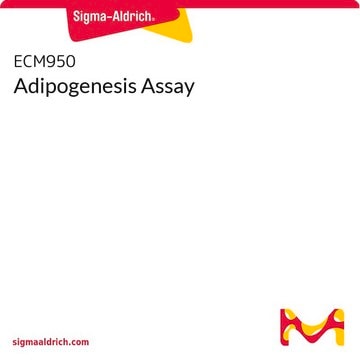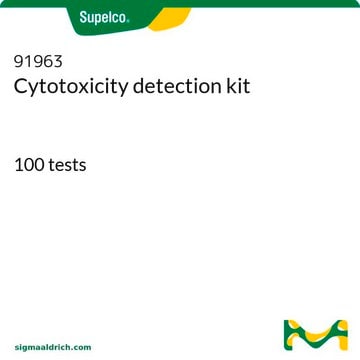MAK040
Adipogenesis Kit
sufficient for 100 colorimetric or fluorometric tests
Sinónimos:
Triglyceride Assay Kit
About This Item
Productos recomendados
usage
sufficient for 100 colorimetric or fluorometric tests
detection method
colorimetric
fluorometric
relevant disease(s)
endocrinological disorders, diabetes; cardiovascular diseases; cancer
storage temp.
−20°C
General description
Omental adipocytes are known to promote the invasion and progression of cancer cells especially, ovarian cancer. Close proximity of tumor cells and adipocytes, causes a phenotypic change resulting in the formation of adipocyte-derived fibroblasts, which directly promotes tumor progression. Elevated level of adiponectin produced by adipocytes is observed in heart failure patients, cardiovascular disease, and atherosclerosis. Excess cytokines such as TNFα (tumor necrosis factor -α) in adipocytes results in chronic inflammatory state and inhibits the process of adipogenesis. Adipocytes are known to maintain glucose homeostasis. Adipocytes regulates the entry of fatty acids into circulation and skeletal muscle. This action of adipocytes is associated with the development of type 2 diabetes, which indicates insulin resistance as a result of high levels of fatty acids in the blood.
Application
Suitability
Principle
signalword
Danger
hcodes
Hazard Classifications
Eye Dam. 1 - Resp. Sens. 1 - Skin Sens. 1
Storage Class
10 - Combustible liquids
flash_point_f
188.6 °F - closed cup
flash_point_c
87 °C - closed cup
Elija entre una de las versiones más recientes:
Certificados de análisis (COA)
¿No ve la versión correcta?
Si necesita una versión concreta, puede buscar un certificado específico por el número de lote.
¿Ya tiene este producto?
Encuentre la documentación para los productos que ha comprado recientemente en la Biblioteca de documentos.
Nuestro equipo de científicos tiene experiencia en todas las áreas de investigación: Ciencias de la vida, Ciencia de los materiales, Síntesis química, Cromatografía, Analítica y muchas otras.
Póngase en contacto con el Servicio técnico








